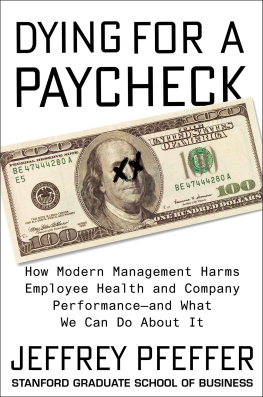Contents
Guide
I f we want to change a world with too many leadership failures, too many career derailments, and too many toxic workplaces, we must begin by acknowledging the facts and understanding why we are where we are. Only then will we begin to enjoy long-delayed progress. Myths and inspiring stories can be comforting, but they are worse than useless for creating change.
I came to understand this truth from experience. Whenever I teach my MBA class, The Paths to Power, or give talks about my book Power: Why Some People Have Itand Others Dont, I often get the same comment: Your material contradicts much of what others say and teach about leaders and leadership. At the same time, many former students tell me that over the course of their careers, they frequently confront a huge disconnect between what the leadership industry tells them to do and what they have learned from me and also from watching othersideas that have made them more effective and successful. My response to these comments: much of the oft-repeated conventional wisdom about leadership is based more on hope than reality, on wishes rather than data, on beliefs instead of science.
The shibboleths of modern leadership loom large and influence how people navigate their careers, often to their detriment. And peoples uncritical acceptance of the feel-good stories told about leadership prevents them from apprehending reality and taking action to make things better. So I decided to engage directly with the topic of leadership and examine why all the writing, blogging, and speaking about leadership and all the money spent on leadership development has been so manifestly unsuccessful in changing workplaces or helping people be more successful in their careers.
Thus, this book is, in a sense, a prequel to Power. Leadership BS explores why so much of the conventional wisdom about leadership and so much of the activity aimed at developing leaders do not fit the facts on the ground. This reality means we need a different way of apprehending human behavior. And we particularly need a different way for teaching and coaching people to be effective in navigating the organizational world in which we all live. These are precisely the objectives of Power and also the class on power in organizations that I teach at Stanford.
I began the writing of Leadership BS with a simple, albeit ambitious, goal: to cause people to rethink, to reconceptualize, and to reorient their behaviors concerning the important topic of leadership. My purpose in all of this is for the next decades of what goes on in workplaces and in peoples careers to be, optimistically, a lot more humane and beneficent than the last decades have been.
I proceed from a historical analogy. Around the turn of the twentieth century, medical practice and medical education in America were pretty dismal. People were hawking untested and unproven cures, with their financial success dependent more on their slickness and persuasiveness than on the actual science or medical efficacy of what they were pushing. Almost anyone could practice medicine, as there was no license required. And while there were some outstanding doctors and scientists building the foundations of modern medicine, charlatans and quacks abounded. Many medical schools were proprietary, for-profit entities with little concern with science, lots of concern for financial gain, and little interest in doing evaluations of what they, or their students, were accomplishing (or, more accurately, the harm they were doing).
Into this morass, the Carnegie Foundation sent Abraham Flexner, who was notably a teacher and not a doctor, to survey the landscape of American medical education. His report, published in book-length form in 1910, transformed the training and also the science and practice of medicine. As a result of that report, one-third of the existing medical schools closed, formal licensing for doctors was instituted, and the biomedical, scientific foundation of medical practicea goal still not perfectly achieved but widely embraced and something that has been responsible for so much progress in the prevention and treatment of diseasewas put into place.
The parallels with the current state of the leadership industry are striking. Want to be a leadership coach? You can go to an institute or enroll in one of many programs, of varying quality and rigor, that train coaches with varying degrees of skill, but you dont have to even do that. You can be a coach tomorrow.
Want to be an expert on leadership? You could get training and exposure to the relevant research literature, but its not necessary. If you are persuasive enough, articulate enough, or attractive enough, if you have an interesting enough, uplifting story or some combination of these traits, you are or can be a very successful leadership blogger, speaker, and consultantwhether or not you have ever read, let alone contributed to, any of the relevant social science on the topic.
To be sure, these days there are many fabulously fantastic people with exceptional credentials and ethics working mightily to improve organizational workplaces and leaders careers. But the leadership industry also has its share of quacks and sham artists who sell promises and stories, some true, some not, but all of them inspirational and comfortable, with not much follow-up to see what really does work and what doesnt. And much like the field of medicine prior to Flexner, what speaks the loudest in the leadership industry seems to be money, rather than evidence-based, useful knowledge. The way leadership gurus try to demonstrate their legitimacy is not through their scientific knowledge or accomplishments but rather by achieving public notorietybe it the requisite TED talks, blog posts, Twitter followers, or books filled with leadership advice that might or might not be valid and useful.
I have no illusions that this book will have anything like the impact of the Flexner report in its effects on the leadership industry. But in a world with too many disengaged, dissatisfied, disaffected employees, and workplaces with too many leaders and aspiring leaders losing their jobs, I feel compelled to make the best case I can for whats wrong with leadership and what might be done to change things for the better. By calling BS on so much of what goes on, this book gives people a closer, more scientific look at many dimensions of leadership behavior. Most important, it encourages everyone to finally stop accepting sugar-laced but toxic potions as cures.
Jeffrey Pfeffer
L eaders fail their people, their organizations, the larger society, and even themselves with unacceptable frequency. Every day, in the news, are more stories of leaders failing.
Leaders fail themselves: Dominique Strauss-Kahn, possibly on his way to being president of France before his arrest for sexually assaulting a New York hotel housekeeper; Brendan Eich, the CEO of Mozilla, the Firefox browser company, resigning because of his political contributions to antigay activities; the former Yahoo CEO Scott Thompson, booted out for claiming on his rsum that he had a computer science degree when he didnt.
Leaders fail their customers: airline executives who have created an experience so unpleasant that their best customers flee for private options and others avoid flying if they can; Amazon, by not carrying some bestselling books and popular DVDs in spats with suppliers; banks inaccurately foreclosing on properties and also debiting customers checking accounts for withdrawals in ways that generate the highest overdraft fees.












